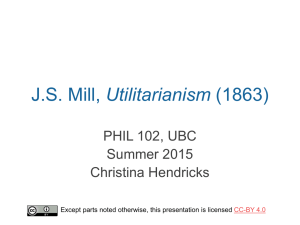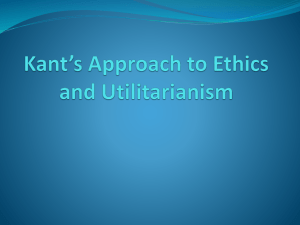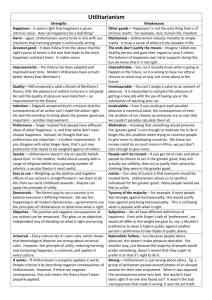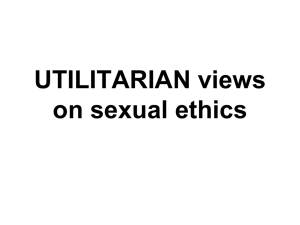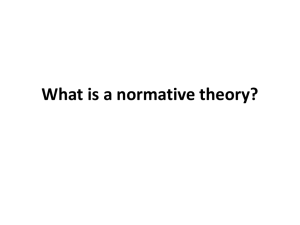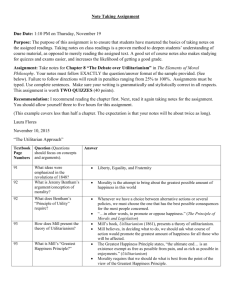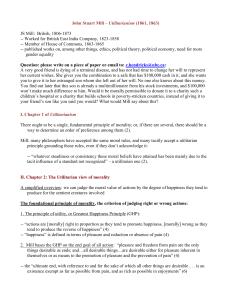John Stuart Mill – Utilitarianism (1861) Discussion questions to
advertisement
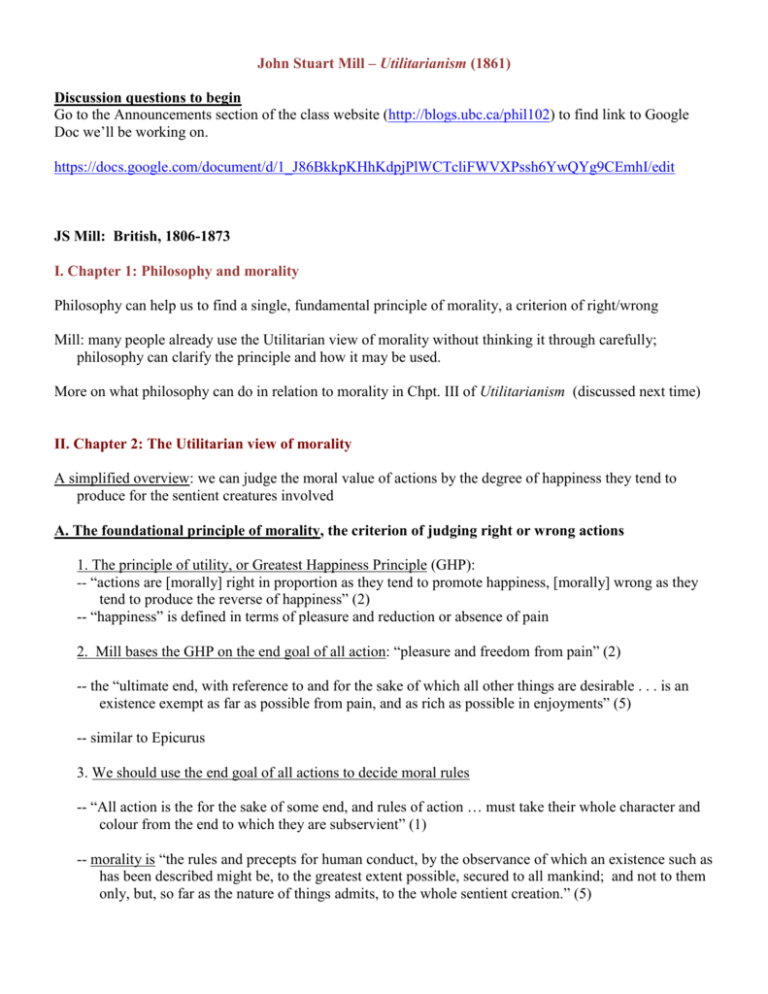
John Stuart Mill – Utilitarianism (1861) Discussion questions to begin Go to the Announcements section of the class website (http://blogs.ubc.ca/phil102) to find link to Google Doc we’ll be working on. https://docs.google.com/document/d/1_J86BkkpKHhKdpjPlWCTcliFWVXPssh6YwQYg9CEmhI/edit JS Mill: British, 1806-1873 I. Chapter 1: Philosophy and morality Philosophy can help us to find a single, fundamental principle of morality, a criterion of right/wrong Mill: many people already use the Utilitarian view of morality without thinking it through carefully; philosophy can clarify the principle and how it may be used. More on what philosophy can do in relation to morality in Chpt. III of Utilitarianism (discussed next time) II. Chapter 2: The Utilitarian view of morality A simplified overview: we can judge the moral value of actions by the degree of happiness they tend to produce for the sentient creatures involved A. The foundational principle of morality, the criterion of judging right or wrong actions 1. The principle of utility, or Greatest Happiness Principle (GHP): -- “actions are [morally] right in proportion as they tend to promote happiness, [morally] wrong as they tend to produce the reverse of happiness” (2) -- “happiness” is defined in terms of pleasure and reduction or absence of pain 2. Mill bases the GHP on the end goal of all action: “pleasure and freedom from pain” (2) -- the “ultimate end, with reference to and for the sake of which all other things are desirable . . . is an existence exempt as far as possible from pain, and as rich as possible in enjoyments” (5) -- similar to Epicurus 3. We should use the end goal of all actions to decide moral rules -- “All action is the for the sake of some end, and rules of action … must take their whole character and colour from the end to which they are subservient” (1) -- morality is “the rules and precepts for human conduct, by the observance of which an existence such as has been described might be, to the greatest extent possible, secured to all mankind; and not to them only, but, so far as the nature of things admits, to the whole sentient creation.” (5) B. Two kinds of pleasure In response to objection that this is a doctrine for swine 1. pleasures differ in quality/kind: intellectual vs. sensual (also described as “higher” vs. “lower,” and those of the “higher faculties” vs. those of the “animal nature” (3-5) a. How does Mill support the claim that the “higher” pleasures are better in quality, not just quantity? (see pp. 3-5) -- only way to judge the value of one kind of pleasure over another is to ask those who have experienced both -- they prefer the “higher” pleasures, even if could be replaced by more of the “lower” pleasures 2. Why might Mill have thought it important to make this distinction, rather than arguing that all pleasures are equally good? -- is it an important distinction to make, in your view? 3. Note that regardless of potential problems with this distinction for individuals, the “higher” pleasures may be more likely to promote greater happiness amongst others (5), so they are better to cultivate in people in order to promote moral actions C. Utilitarianism is a consequentialist moral theory; also, there’s a difference between “act utilitarianism” and “rule utilitarianism” 1. Mill’s view is hedonistic consequentialist: -- value hedonism: pleasure and reduction/absence of pain are the highest goods, the only intrinsically good things -- consequentialism: actions derive their moral value from the value of their consequences -- so consequences of actions are morally good if they increase pleasure or reduce pain, or lead to something else that does so, for all involved How does this sound to you as a justification for which actions are morally right/wrong? What questions does this raise for you? Do you see potential problems with it? 2. Two (of many) forms of utilitarianism: a. Act Utilitarianism (or “direct” utilitarianism): particular acts are judged morally right/wrong by their actual in particular circumstances -- or by their probable or foreseeable consequences, given the circumstances, in some other versions b. Rule Utilitarianism (or “indirect” utilitarianism): particular acts are judged morally right/wrong by their conformity to moral rules, where moral rules are judged according to their consequences -- good moral rules are ones that would promote the most happiness if they were accepted and adhered to by most people Act Utilitarianism Particular actions, such as lying, breaking promises, stealing Moral worth determined according to Rule Utilitarianism Particular actions, such as lying, breaking promises, stealing Moral worth determined according to Rules about what sorts of actions are moral/immoral GHP These rules based on the consequences on happiness if generally followed GHP 3. Mill says some things that sound like Rule Utilitarianism a. regarding what must be abstained from, “though the consequences in the particular case might be beneficial” – must consider if “the action is of a class which, if practised generally, would be generally injurious, and that this is the ground of the obligation to abstain from it.” (6) b. the value of a rule saying we ought generally to tell the truth (not in our reading, but in Chapter II of Utilitarianism) -- deviation from truth weakens “the trustworthiness of human assertion,” which is critical to human social life and well being -- so a rule of usually telling the truth is good because it promotes the greatest happiness if followed -- still, there are possible exceptions, and we should use principle of utility to decide what sorts of situations would make telling a lie acceptable c. we need to use secondary principles to guide our actions, not the GHP -- these are based on which sorts of actions tend to lead to greater happiness and which do not (7-8) -- philosophers can help determine which rules fulfill GHP and which do not, and to decide how to handle conflicts between these rules (8-9) d. also his discussion of rights and justice in Chapter V, assigned for next week D. Whom do you have to consider when calculating consequences? 1. (as noted above) all “sentient creation” (5) 2. not everyone in the entire world, only those “concerned” with an action (6) 3. everyone’s happiness is to be treated impartially, counted equally (5) E. Motive does not matter when judging moral value of actions (6) -- but it does when judging moral value of persons (6, also footnote on p. 9) -- still, we should use education, law, social arrangements to try to ensure that individuals view the happiness of others as important to promote, so they do this as consistently as possible (5-6; 16-17 (assigned for next time) III. What would someone who adheres to Mill’s view be likely to say about the questions with which we began? Go to the “announcements” section of our website to find this link: http://blogs.ubc.ca/phil102 https://docs.google.com/document/d/1_J86BkkpKHhKdpjPlWCTcliFWVXPssh6YwQYg9CEmhI/edit 1. You find yourself with an unexpected amount of money—a distant relative has left you an inheritance of $10,000. Would there be a moral difference between using it for the following reasons? In other words, would some uses of the money be morally better than others? If so, which and why? a. use it to buy yourself new furniture, a new computer, new phone, and an excellent sound system for your home b. save or invest it for your child’s university education c. donate it to the local children’s hospital d. donate it to a charity that helps build schools for children living in poverty in a different country than yours 2. A very good friend is dying of a terminal disease, and has not had time to change her will to represent her current wishes. She gives you the combination to a safe that has $100,000 cash, and she wants you to give it to her estranged son whom she left out of her will. No one else knows about this money. You find out later that this son is already a multimillionaire and $100,000 won’t make much difference to him.Would it be morally permissible to donate it to a charity such as (c) or (d), above, instead of giving it to your friend’s son? 3. You work for a cosmetics company that donates some of its profits to a group who fights against the use of animal testing for cosmetics. You know, though, that the directors of the company don’t actually care about this issue, and are donating money because it will help them sell products--they said as much in several meetings. Would you call the company’s donation of money a morally good action? Why or why not? III. Chapter 3: the “sanction” of the principle of utility 1. Questions addressed in this chapter: a. Can we instill in people a sense that promoting the greatest happiness is a moral duty, something obligatory? If so, how? b. Can it become part of people’s “conscience” that they should act in ways that promote the greatest happiness? 2. (in response to (a)) Partly through external sanctions, such as “the hope of favour and the fear of displeasure, from our fellow creatures or from the ruler of the Universe” (10) -- but also through an “internal sanction,” “a feeling in our own mind; a pain … attendant on violation of duty” (10) -- in other words, through our “conscience” 3. Yes, we can attach conscience to the principle of utility (in response to (b)) (i). conscience can likely be attached to almost any moral principles, but it won’t work for long if the moral principles are not in some way grounded in feelings natural to humans (11) (ii). we do have natural feelings of concern for others, desire to live and cooperate with others in social groups (11-12) (iii). as we live together in groups, we get a sense of unity with others, of having similar goals we are cooperating to achieve, and this leads us to feel that we ought to consider their happiness (12) -- societies are advancing more and more towards equality between people, so these feelings have been growing stronger (iv). education and external sanctions can help nourish even more the sense that we ought to consider the happiness of others when acting (12) 4. so philosophy can not only find a foundational principle of morality (GHP), but also suggest social, political, educational policies -- we should design social institutions so that a sense of duty for promoting general happiness is instilled in people as much as possible


